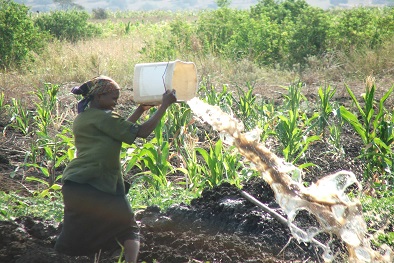The CPWF research in the Limpopo identified some interventions to help promote climate adaptation and water security within the Limpopo basin;
- In attempting to improve the water security challenges faced in Limpopo River Basin, an assessment of the socio-political, economic, institutional and market forces need to be carried out before any technologies aimed at improving agricultural productivity can be implemented.
- Providing incentives for the uptake of agricultural technologies.
- Livestock rearing is a common practice among small holder farmers but due to dry seasons and frequent droughts, the challenge is for farmers to ensure their livestock have enough feed to survive the drought season. Therefore, farmers are encouraged to grow fodder crops on part of their land. For those farmers who grow maize, they are encouraged to do crop rotation with velvet bean that helps to improve soil fertility and can also be used as livestock feed.
- For a new technology to be adopted, awareness and knowledge sharing should be facilitated. CPWF has created platforms that link farmers with input suppliers and value chain actors who can deliberate on challenges and opportunities for agricultural productivity and profitability.
- Poverty mapping was also carried out by CPWF to identify and locate poor areas and also provide information on social characteristics that hinder development. This move allows for the appropriate allocation of programs and interventions aimed at alleviating poverty and food insecurity.
- For successful intervention to be achieved, regional and national organisations must have a say in identifying research agendas. Aligning existing research agendas and research can allow researchers to use their findings to contribute to outcomes and impact.
CPWF’s recognition of female farmers’ contribution to agricultural production has allowed for the engagement of agricultural extension workers to assist by initiating schemes that ease the domestic work load of women. This in turn gives female farmers ample time to work in their fields and enabling them to contribute to water security through agricultural production.
Currently, GWP SA is strategizing and preparing the dissemination of the CPWF research outputs that were developed over the past 3 years. The knowledge products will be developed for end users and decision makers as a means of fostering regional ownership of project outputs and outcomes through partners national and regional dissemination events.
These dissemination channels will contribute to the solution of improving governance and management of rain water in a bid to raise productivity, reduce poverty and improve livelihood adaptation in the Limpopo.
A number of key organizations, such as the Limpopo Watercourse Commission (LIMCOM) and the Southern African Development Community (SADC) strongly supported CPWF’s approach in the Limpopo River basin, and both institutions are planning to incorporate CPWF findings into ongoing work. GWPSA will further engage with SADC, Waternet and NEPAD CoE as well as other strategic R4D partners (such as CCARDESA) on taking Research for Development forward in the region.
Read the Summary of the CPWF Research in the Limpopo River Basin over the past three years.
More information on CGIAR Challenge Program on Water and Food may be found on: www.waterandfood.org ; www.cgiar.org
Photograph: Matthew McCartney / IWMI
